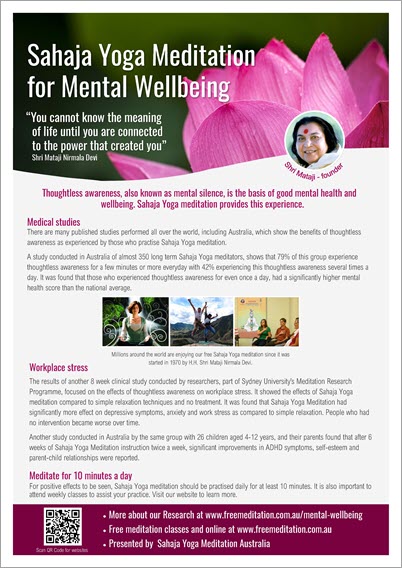Wellbeing & Research
Thoughtless awareness meditation, also known as mental silence, is the basis of good mental, emotional and physical wellbeing. Sahaja Yoga meditation provides this experience.

Thoughtless awareness meditation
Research conducted in Australia, and elsewhere, indicates that Sahaja Yoga meditation can improve mental, emotional and physical wellbeing plus reduce stress. Recent studies suggest that this meditation is unique even when compared to other forms of meditation. People who meditate regularly, using thoughtless awareness meditation for around 20 minutes a day, may find they become healthier, calmer and much more relaxed, with an improved outlook on life.
Sahaja Yoga Meditation aims to address emotional, mental and physical imbalances by awakening our innate spiritual potential. This is a simple but profound experience that naturally enables us to harmonise and integrate our life in a more positive way. Regular meditation naturally eliminates a lot of the inner stress and tension that we experience on a day to day basis.
Medical studies
A study conducted in Australia of almost 350 long term Sahaja Yoga meditators, shows that 79% of this group experience thoughtless awareness for a few minutes or more everyday with 42% experiencing this thoughtless awareness several times a day. It was found that those who experienced thoughtless awareness for even once a day, had a significantly higher mental health score than the national average.
Workplace stress
The results of another 8 week clinical study conducted by researchers as part of Sydney University’s Meditation Research Programme, focused on the effects of thoughtless awareness on workplace stress. It showed the effects of Sahaja Yoga meditation compared to simple relaxation techniques and no treatment. It was found that Sahaja Yoga Meditation had significantly more effect on depressive symptoms, anxiety and work stress as compared to simple relaxation. People who had no intervention became worse over time.
Another study conducted in Australia by the same group with 26 children, aged 4-12 years, and their parents found that after 6 weeks of Sahaja Yoga Meditation instruction twice a week, significant improvements in ADHD symptoms, self-esteem and parent-child relationships were reported.
Meditate for 10 minutes a day
For positive effects to be seen, Sahaja Yoga meditation should be practised daily for at least 10 minutes. It is also important to attend free weekly classes to assist your practice.
Videos on medical research and the Mind.

Mental wellbeing benefits of Sahaja Yoga
Professor Rubia presents clinical studies showing meditation can improve physical and mental wellbeing such as improving the symptoms of depression, anxiety and work stress and phyiscal problems like asthma and low blood pressure.

Shri Mataji talks about the mind and thoughtless awareness
Mind is not real but the product of our reactions to the world around us, and it has a limiting effect on us. With kundalini awakening a state beyond the mind, called ‘thoughtless awareness’ is achieved which is the first encounter with reality.
Mental wellbeing information sheet
Medical research websites


